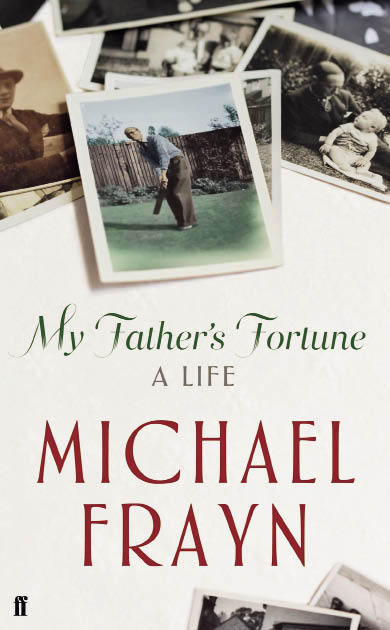Tom Frayn, says his son Michael in this admirable memoir, trod lightly upon the earth. He belonged to a class and a generation who didn’t think their story mattered. Even his profession — he was an asbestos salesman — has ceased to exist. At the request of his own children, who felt that they had ‘risen from an unknown place’, Michael Frayn has collected the few scraps of evidence and pieced together this unobtrusive life.
His father was a ‘smart lad’, youngest of a family of seven housed in two rooms off the Holloway Road, and the only one not born deaf. (He suffered hearing loss later, but, characteristically, used it to enhance his comic timing.) Tom’s wit and charm found plenty of customers for his toxic wares. He moved his family to a detached house with a big garden and an Austin saloon in the garage. Respectable interwar Sutton was a far cry from the grime and grind of Edwardian Holloway. There were (ghastly) private schools for young Michael and his sister Gill, unused decanters for port and sherry on the sideboard, and annual holidays in Bridport or Newquay.
Nevertheless, Tom developed ‘very little middle-class sense of material possession’. The house was rented, the car went with the job, money for school fees dried up — releasing Michael to the more civilised, though less prestigious, grammar school. When he died, Tom Frayn left no will, £1,500, a small cardboard box containing all his worldly goods, and a memory of his ever-cheery smile.
The book’s title is ironic. Fortune, in the obvious sense, didn’t much interest this humorous, dapper, uncomplaining man, and it doesn’t much interest his son either. What does intrigue Michael Frayn is his father’s legacy of influence, his role in shaping Michael’s own fortune, as a writer and as a father.
The result is a profound delight. Like his father, Frayn treads lightly. With deft, witty touches, he resurrects the past. His own infant self sits secure in the ‘vast, warm, luxuriously upholstered human settee’ that is his grandfather’s lap, his eyes closed to blot out his Uncle George’s terrifying eyebrows, beetling at him across the Sunday tea-table as Michael negotiates fairy cakes by touch. It is 1940, and Tom Frayn, always one for a bargain, employs Irish navvies to build an air raid shelter. It floods after a single use. Unabashed, Tom buys ducks, who have ‘sole occupancy of what is now effectively an armoured duck pond’; the family shelters instead in the cupboard under the stairs. Young Michael is mortified when the inquisitive little girl at No. 10 orders him to remove his underpants, because in the interests of economy they’re many sizes too big, held up by a humiliating safety pin.
The cigarettes, the hopeless toy cricket bat, the glamorous auntie wafting ‘Evening in Paris’ . . . it would be easy to swallow the book at a sitting, so temptingly does Frayn set out the delicious domestic morsels that are his wares. But My Father’s Fortune deserves, and repays, closer attention. It is a meditation on the action of time and chance on human lives; on love, loss, memory; on the way human creativity can fictionalise the past without falsifying it.
The story turns on a single catastrophe, when Michael’s mother, Vi, beautiful, musical, temperamental but devoted, reaches for a glass of sherry and drops down dead. Life for the survivors divides itself into Before and After. After is grim. Vi is never mentioned again. ‘She has been airbrushed out of the historical record, like one of Stalin’s victims.’ But even in the sunlit Before, there is a sense of fragility amidst the cosiness. Furniture is makeshift, machines malfunction, the resident grandmother, Private Frazer-like, believes they’re all doomed, and when a doodlebug takes the roof off, she’s nearly proved right. And there’s the threat of the asbestos, unsuspected, lurking.
Vi’s undetected weak heart was the legacy of a childhood bout of scarlet fever. Decades later, the dead hand of the past reaches out to claim her daughter. Gill has mesothelioma, caused by exposure to the asbestos samples her father cheerfully sawed up to make wonky and unprepossessing fixtures and fittings. Even on Gill’s deathbed, she and Michael find that ‘the term “our mother” is still unusable between us’.
Reading this book on a train, I overheard a young man on his mobile arranging to remove all traces of asbestos from a property he was renovating. Michael, inheritor of his father’s way with words, his comic sense, and perhaps above all his sense of luck, survives to carry Tom’s memory ‘out of the ashes of the past in the way that the pious Aeneas bore his father Anchises on his back out of the ashes of Troy’, and it is a measure of the book’s quality that this sounds appropriate, not pretentious. Gill, disinherited of her luck, is choked by those same ashes.
Charlotte Moore’s latest book, Hancox: A House and a Family, is published by Viking, £20.






Comments